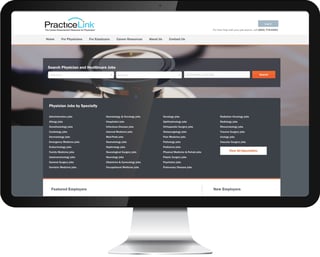By serving as a resource to job-seeking physicians, you help both them and yourself. Here are some ideas for recruiters who want to double as a resource for residents.

We know the candIdates we’re looking for: those who are current in their fields, hard-working and looking for new positions. This includes (but isn’t limited to) residents and fellows. Once their training is completed, they’ll all be in search of new positions.
The struggle lies in knowing how to get face time with them. Training programs are selective about who can meet with their residents. If you are trying to get into a training program with a self-promoting, straightforward recruitment message, good luck. If, however, you can provide something of value to the residents, your chances increase greatly.
A few weeks ago, my colleague Tiffanie Lee and I presented at the grand rounds for a program in New York. Our presentation was on PracticeLink’s “What To Do When During Your Job Search,” the 10-step job-search timeline we created for residents and fellows. The main goal of the presentation was to help these physicians learn how to navigate their jobs searches; promoting PracticeLink was secondary. By providing something valuable, we helped both our audience and ourselves.
Such an approach can be useful for recruiters as well. By being a resource to residents, you stand not only to make valuable connections with these job-seeking physicians but also to benefit them by aiding them in their searches.
Here are a few ways you can share your knowledge with residents — whether you’re presenting at a program or just sharing information with them in conversation:
Describe the different types of practices.
Every practice setting has its pros and cons, and most physicians are better suited to certain settings than others. Though you are likely well-versed in the difference between practicing in a hospital and practicing in a small clinic, residents may have given little thought to which one suits their needs and how each would differ in the day-to-day. Help residents consider their options by explaining the practical differences between single specialty groups and multispecialty groups, solo practices and group practices, small health groups and large ones, stand-alone hospitals and national organizations, etc.
Educate on money management or loan repayment.
Many residents will soon be transitioning from salaries of $50,000 per year to as much as a few hundred thousand per year. Some physicians, when faced with this newfound expendable income, also find themselves faced with newfound financial issues that arise from major spending on purchases like new homes and cars. By educating residents about how to handle the salary transition wisely and pay off their loans promptly, you can save them years of headaches. You can also be a resource to residents by informing them about the many state and federal programs available to assist with their student loans.
Inform them of CV services and must-haves.
There are many services available to help physicians create professional CVs, but not all residents know about them. Some tools, like PracticeLink, are free; others charge a fee. In addition to telling physicians about these services, let them know what information is most important to recruiters, what to include or exclude and what the different types of CVs are (e.g., academic or non-academic).
Explain the physician interview and site visit process.
Help residents by teaching them how to prepare, how much time to allot and what to expect. The more they understand, the better prepared and more confident they will feel. Providing this type of education to residents demonstrates to a program that you are interested in their physicians’ needs, not just self-promotion. This may lead to opportunities to give additional presentations in the future or even invitations to return every year to speak with the new residents. If, as they say, “a simple hello can lead to a million things,” imagine the endless opportunities that could come about from being a resource for these programs.








